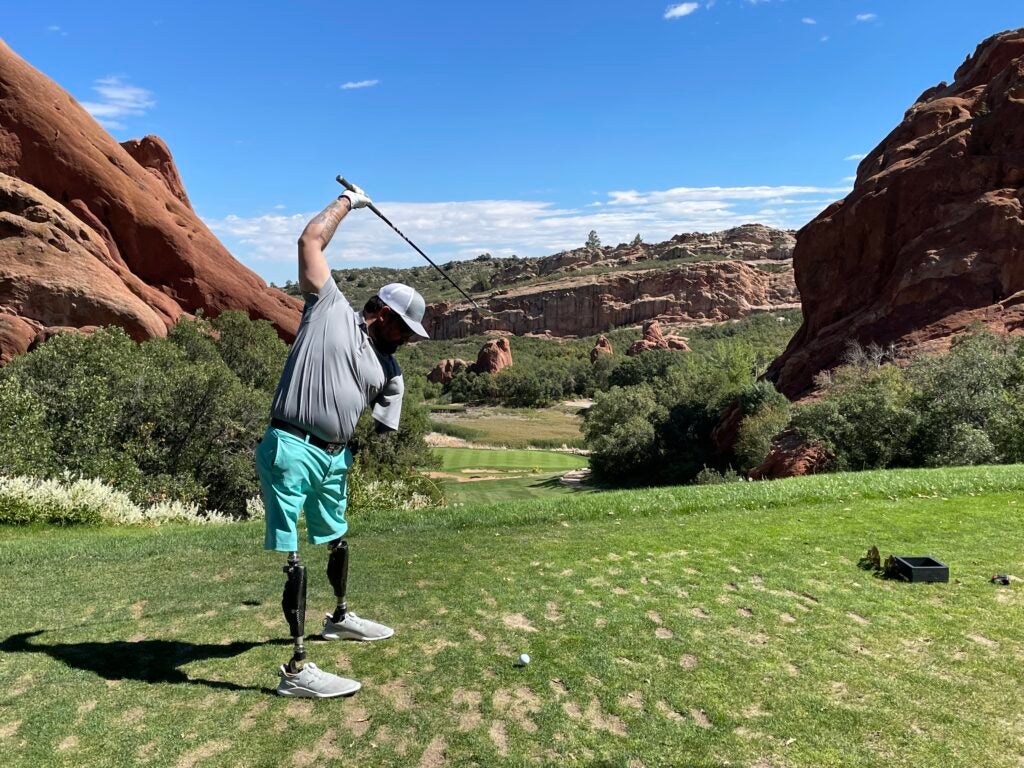Reprinted with permission from We Are The Mighty. Written by Jessica Manfre.
In an instant, the life of Marine Corps Sergeant (Ret) Nick Kimmel was irrevocably changed because of an Improvised Explosive Device (IED). Despite catastrophic injuries – he hasn’t slowed down. His response when he’s told he can’t do something? Watch me.
Kimmel was always passionate about sports and being outdoors growing up in Washington State. Despite being a really good baseball player and having a few college options, he chose to serve. But it wasn’t always the plan.
 “A bunch of my buddies were actually all joining the Marine Corps at the same time and they convinced me to go in and talk with a recruiter. When I talked to him, I liked what he had to say and I ended up joining,” he laughed. “It was a quick transition from not having any interest in the military to being signed up.”
“A bunch of my buddies were actually all joining the Marine Corps at the same time and they convinced me to go in and talk with a recruiter. When I talked to him, I liked what he had to say and I ended up joining,” he laughed. “It was a quick transition from not having any interest in the military to being signed up.”
It was 2008 and he shipped off for boot camp not long after graduating high school. He was in Afghanistan on December 1, 2011, during his second deployment to the region when it all went black. “We were building a small base and I was standing on a forklift when I jumped down unknowingly onto 40 pounds of homemade explosives,” Kimmel shared. “Only about 13 pounds detonated but it was enough to take both of my legs above the knee and my arm above the elbow instantly. All my amputations are traumatic right there at the scene.”
Though he doesn’t remember anything of the blast, fellow Marines filled in the blanks. A quick reacting Sergeant ensured his tourniquets were on tight enough, effectively saving his life. “That IED was meant for a vehicle, I’m just lucky it didn’t all explode. My guys told me when I met them after they got back that they found my left boot with my foot still in it 200 yards away and they buried it there for me. So, there’s a piece of me in Afghanistan forever,” Kimmel said.
After being flown from base to base and going in and out of surgery, he chose to do his rehab in a hospital in San Diego to be closer to home. “After my injuries they told me it would take 13 months to be walking up on full length legs. I did it in seven,” he smiled. Kimmel and his father actually flew to Japan to meet his unit when they came back from the deployment.
Despite crushing all of the odds, Kimmel struggled with suspension, skin and socket issues in his prosthetics. In 2018, he was able to get into a clinical trial for Osseointegration (or the OPRA System) which is a bone anchored prosthesis system, avoiding the socket and the issues coming with it.
“The human body is not designed to support weight on soft tissue. That’s why so many amputees have all these muscle problems and skin breakdown because your body is just not designed for it,” he explained. “When I went with Osseointegration, everything went into the bone supporting weight again so now my prosthetic is attached to my femur.”
Kimmel is a proud ambassador for the technology and spends a lot of time talking to other amputees about going for it. “Obviously there’s some patients it doesn’t make sense for. If you’re extremely mobile already and don’t have issues, why open yourself up to the possibility of infection with this surgery? I get it,” he said. “But if you’re constantly having skin breakdown or sores with the socket, that’s opening you up for infection, too.”
Not long after going with the OPRA system, he fell back into golf – a sport he’d always loved. Kimmel even competes with other amputees. “I just went on vacation to Hawaii and I was climbing through the caves of lava tubes and stuff. I was crawling, climbing down rocky trails. There’s no way I could have done it in sockets,” he added.
He didn’t shy away from explaining he still has bad days, too. But for him, it’s about how you approach the situation you’re given. “You have to push past the negative and into finding the good in your future,” he explained. “It’s simple. What happens happens, you can’t change it. Looking back or dwelling can just cause more problems. I’m a Marine. Adapt and overcome.”

